Switzerland eyes German elections
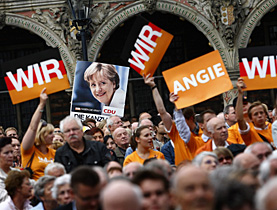
Switzerland's northern neighbour, Germany, is holding elections on Sunday, which could see a change in the ruling coalition.
Polls point to a tight vote, although it is expected that the current chancellor, Angela Merkel of the centre-right Christian Democratic Union, will stay in power.
The question is whether the liberal Free Democratic party (FDP) will gain enough votes to enter a coalition with the CDU and its Bavarian sister party, the CSU, or whether Merkel will be forced to continue sharing power with the Social Democrats (SPD).
Other combinations involving the Green party are seen as much less likely.
Switzerland cannot ignore what happens in Germany: it is the country’s biggest trade partner and there are over 233,000 German nationals resident in Switzerland.
“A stable political situation… and good trade relations [with Germany] are of major importance to us,” Fridolin Marty of the Swiss Business Federation economiesuisse told swissinfo.ch.
Ralph J. Bopp, director of the Germany-Switzerland Chamber of Commerce, stressed the importance of the elections.
“They will set the course for the direction which German economic policy will follow in the next few years,” he explained.
Financial crisis
Although generally qualified as “good”, relations have been somewhat strained this year over Switzerland’s bank secrecy and accusations that Swiss banks have helped German tax payers to evade their obligations.
The German finance minister, Peer Steinbrück, became the man the Swiss loved to hate after his brutal attacks on the Swiss finance system: back in October 2008 he talked of “using a whip” against Switzerland, and he added insult to injury in March by comparing the Swiss to Indians “running scared” from the cavalry.
Although a member of the SPD, Steinbrück is regarded as being close to Merkel. His overriding priority is to bring down Germany’s debt and deficit levels.
Thomas Straubhaar, the Swiss director of the Hamburg Institute of International Economics (HWWI), explained to swissinfo.ch that reducing the debt and deficit will be the main challenge facing the next government, whatever its format.
“The fallout from the financial crisis will dictate the political agenda for some time to come,” he warned.
Tim Frey, secretary general of Switzerland’s centre-right Christian Democrats agrees. He told the Swiss News Agency that whatever the colour of the next German government, it will continue to try to prevent its tax payers hiding their assets in Swiss banks.
“Switzerland attached too much importance to the tone of [Steinbrück’s] attacks, and not enough to the content,” he said.
Hopes and fears
The representatives of most of the Swiss parties interviewed by the Swiss News Agency agreed that the results of the elections are unlikely to produce any major changes in relations between Switzerland and Germany.
Unsurprisingly, the centre-right parties and business circles would prefer a so-called “black and yellow” coalition, between the CDU/CSU and FDP, while the centre-left Social Democrats would rather see a continuation of the “black and red” government.
“The reforms preached by the German Liberals would help to strengthen the country’s economy,” Stefan Brupbacher, secretary-general of the similarly-minded Swiss Radicals told the news agency. “The repercussions for Switzerland would be positive.”
The Radicals hope that the German Liberals will support the plan for a global tax collection service put forward this month by the Swiss Bankers Association. The scheme is designed to preserve banking secrecy, while ensuring that foreign governments receive the money they are owed.
For Germans resident in Switzerland tax would automatically be levied on their assets and transferred to the German authorities.
Uncertainties
German-born political scientist Klaus Armingeon of Bern University pointed out to swissinfo.ch that even if the FDP does enter the government, it will not always see eye to eye with its larger partner. The CSU/CDU is still strongly influenced by Catholic social attitudes.
“The conservative model mistrusts the market and strongly supports the family,” he said.
Meanwhile the Swiss Social Democrats are worried about a possible change in government.
“A black and yellow coalition would not be a good signal for workers at this time of crisis. They would be all alone at the mercy of a hardline government,” the party said in a written statement given to the Swiss News Agency.
Julia Slater, swissinfo.ch (with input from Andreas Keiser and Paola Carega)
Swiss imports from Germany in 2008 totalled SFr 65.8 billion ($64.2 billion) – about as much as those from Italy, France, the US, Netherlands and Britain combined.
Germany has for many years had a trade surplus with Switzerland: in 2008 this was SFr23.1 billion.
Switzerland is the sixth-biggest foreign investor in Germany, with SFr50 billion.
Some 1,200 Swiss enterprises in Germany provide 260,000 jobs.
More than 44,000 commuters from southern Germany cross the border every day to work in Switzerland.
Switzerland is the most popular destination for German emigrants. There are more than 233,000 Germans currently resident in Switzerland, the second-largest group after Italians. In 2008 more than 31,000 Germans took up residence.
One main area of contention between the two countries is over cooperation in tax affairs, where Switzerland rejects German accusations that it is a tax haven.
A second major problem is the issue of German objections to flights over its territory by planes using Zurich airport.
(source: Swiss foreign ministry foreign affairs report, 2009)
Six parties are represented in the current German parliament.
The Christian Democratic Union (CDU) of Chancellor Angela Merkel is a conservative party with Roman Catholic roots. Its traditional strongholds are in rural and Catholic regions.
The CDU’s sister party in Bavaria is the Christian Social Union (CSU).
The Social Democratic Party (SPD) is Germany’s oldest and largest political party; its strongholds are in the large cities, especially in the north and west.
The Free Democratic Party (FDP) is a liberal, pro-business party. It has often held the balance of power, and thus entered governments of both the major parties as a junior member.
Alliance 90/The Greens is a centre-left party, created by the merger of the Green Party of the former West Germany and an alliance of non-Communist political groups in the former East Germany (GDR).
The Left is the newest party: it was created by the merger of the successor to the ruling party in the GDR and a leftwing group that broke away from the ruling Red-Green coalition in 2005.
The FDP has ruled out joining a coalition with the SPD and Greens, and the Greens will not join a CDU-FDP government.

In compliance with the JTI standards
More: SWI swissinfo.ch certified by the Journalism Trust Initiative
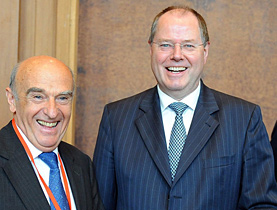
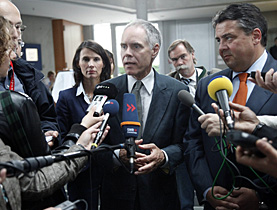
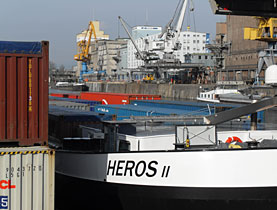
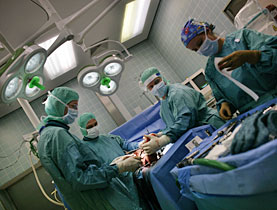
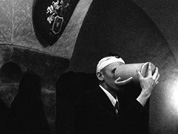
You can find an overview of ongoing debates with our journalists here. Please join us!
If you want to start a conversation about a topic raised in this article or want to report factual errors, email us at english@swissinfo.ch.